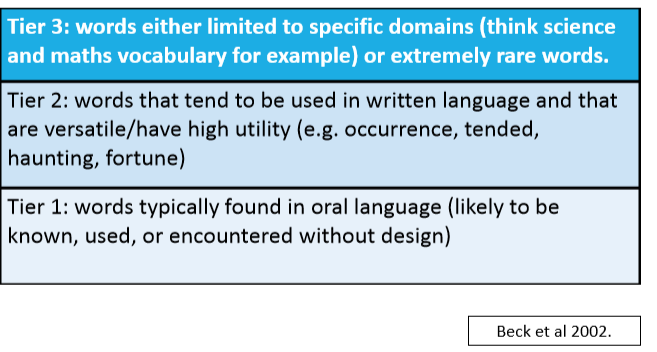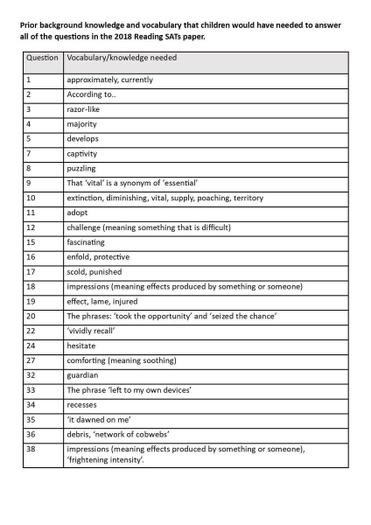 Our Lady Immaculate Catholic Primary School are proud to be a Word Gap Partner School in association with Oxford University Press. We are committed to closing the word gap and improving children’s vocabulary and wider life chances. To find out more about the word gap, visit oxford.ly/wordgap.
Our Lady Immaculate Catholic Primary School are proud to be a Word Gap Partner School in association with Oxford University Press. We are committed to closing the word gap and improving children’s vocabulary and wider life chances. To find out more about the word gap, visit oxford.ly/wordgap.
Vocabulary is a strong indicator of reading success (National Literacy Trust, 2017). We know from research that the size of a child’s vocabulary is the best predictor of success on future tests. Children with a poor vocabulary at five are four times more likely to struggle with reading in adulthood (Why Closing the Word Gap Matters: Oxford Language Report, 2018). At Our Lady Immaculate, we also know that a good understanding of a wide range of vocabulary supports success across the whole national curriculum. Therefore pupils are regularly taught new vocabulary in all areas of the curriculum.
Developing vocabulary occurs in two ways:
- Through indirect instruction; using rich reading experiences to grow vocabulary ‘naturally.’ Paying attention to context to work out meaning and using background knowledge; and
- Through direct ‘robust’ instruction.
Good vocabulary instruction involves:
- Decisions about which words to teach
- Decisions and expertise around how to teach these words
Vocabulary learning is taught in a fun and active way across the curriculum and innovative ideas such as the use of digital technology is used to enhance the learning.
Teachers carefully select vocabulary they want to directly teach. Teachers plan direct instruction for tier two words, as they can have a powerful impact on verbal functioning and can be applied to a range of different situations (Beck et al, 2013).

Below shows the prior background knowledge and tier 2 vocabulary children would have needed to know in order to access the questions in the 2018 KS2 Reading SATS paper.
 As a school, we value the importance of vocabulary by making words a priority in our classrooms, empowering our pupils, having fun and enriching the whole school. We believe words and vocabulary are much more than just a piece of the educational jigsaw; words are a constant. Since the beginning of mankind, language and words have evolved with us and are the lifeblood of humanity. Vocabulary surrounds, engulfs and guides us every day; without words we’d be lost.
As a school, we value the importance of vocabulary by making words a priority in our classrooms, empowering our pupils, having fun and enriching the whole school. We believe words and vocabulary are much more than just a piece of the educational jigsaw; words are a constant. Since the beginning of mankind, language and words have evolved with us and are the lifeblood of humanity. Vocabulary surrounds, engulfs and guides us every day; without words we’d be lost.
The great thing about vocabulary is that it is extremely accessible for all pupils – it literally empowers them. Pupils quickly become adept at using more complex language, varying verbs and adjectives, while developing a greater capacity to show not tell. Quite quickly, ‘big’ will become ‘enormous’; ‘happy’ will become ‘elated’; and what was once ‘boring’ will become ‘mundane’, even ‘tedious’.
As a school we understand that we can’t create more time, and that vocabulary should underpin all aspects of the curriculum. Every interaction, every conversation, every minute, every lesson, every day is vital – it’s about the sum of all the small parts and valuing the marginal gains of each interaction, taking pride in the micro-victories. We make the most of the time that pupils are with us in school.
Strategies to support vocabulary development:
- Teachers have used resources from Alex Quigley and the Oxford University Press to become more knowledgeable and confident in explicit vocabulary teaching.
- Academic vocabulary is taught explicitly and clearly across all subjects, where new words are introduced through ‘My Turn, Your Turn’ and contextualised examples to rehearse language and to begin to use words with competency.
- Structured reading opportunities are organised for all children to have exposure to new vocabulary whilst developing strategies for how to tackle unfamiliar words in context.
- We promote and scaffold high quality academic talk in the classroom, with key terminology clearly displayed for children to refer to in their own talk and writing.
- Word of the Week (KS1) and Word of the Day (KS2) where children are introduced to new words with the opportunity to explore its word class, morphology, etymology and to practise using within a sentence.
The vocabulary learning environment
At the beginning of lessons, children are shown key terms related to their learning to discuss and activate their prior knowledge. Teachers are able to use this to ascertain the starting point for the lesson. The learning environment supports vocabulary development with key words, images and contextualised examples.
Concept maps and knowledge organisers include key vocabulary for the children to develop and become proficient with throughout units of work. These are regularly referred to in class and copies are sent home for children to rehearse vocabulary out of school too.
Vocabulary is a key component of our curriculum. It is regularly referred to throughout all interactions. We provide opportunities for the children to encounter vocabulary through high-quality texts, all conversations, independent reading, being read to, modelled writing, listening to others, fiction and non-fiction, poetry, direct teaching, books, picture books, assemblies, encounters on trips and with experts, and performances.
If you would like to find out more, please click here
WordGapPartnerSchool_A4Certificate
